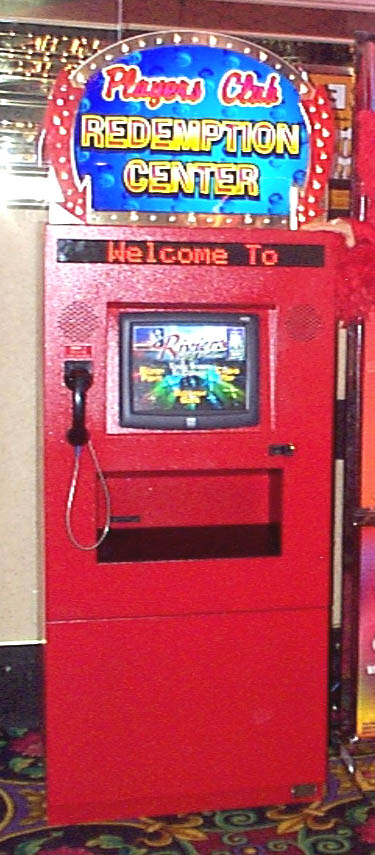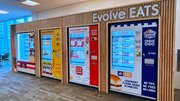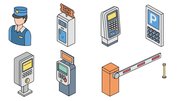News
High rollin' kiosks
When a noted Las Vegas casino resort and hotel turned to kiosks to refine its customer loyalty program, the response from patrons was surprising.
May 27, 2004
In gambling terms, it could have been considered a long shot: Take a demographic group that does not adjust easily to modern technology, give it a technological advance, and see if it works.
The Riviera Hotel and Casino, one of the venerable members of the ever-growing Las Vegas casino scene, did just that when it installed three customer-loyalty kiosks last September.
"We weren't sure how the kiosks would be received and that was a big problem," said Mark Boyer, Riviera director of IT services. "The Riviera's average customer is a little older, in their mid- to late-50s. They are not a tech-savvy crowd."
But based on the early results, it appears that the casino has bucked the odds. The kiosks, which allow loyalty club members to check their points and print out redemption coupons, are generating significant traffic. And a fourth kiosk, originally designed as a training unit, is being added to the mix later this spring.
The program cost the Riviera $200,000, but Boyer said the casino has been rewarded thus far with happy clients and a smooth-running system.
"Over 50 percent of the total redemptions at the hotel are being done through the kiosks, instead of at the redemption desk, which is far beyond what we'd anticipated," Boyer said in early May. "Last month we did about 2,500 transactions over the kiosks."
Happiness 24-7
Customer loyalty programs have been in place at most casinos for several decades. The concept is simple. Regular casino goers sign up for the program and receive a card, swipe the card or show it to dealers when they gamble at the casino, and accumulate points based on what they wager.
Certain point levels allow customers to receive perks, from free meals to room upgrades and free accommodations. The goal for casino marketers is to encourage players to gamble exclusively at their casinos.
Riviera's kiosk program grew out of concern that the customer was not being serviced adequately using the manned redemption booths, which are open daily from 9 a.m. until midnight.
 |
The Riviera's loyalty club kiosk allows patrons to check their points and print out coupons for free meals at the casino's dining establishments. |
"Even when we had two of them (the Riviera now has one redemption desk), they weren't manned 24 hours a day," Boyer said. "The customers have to be able to do their redemptions at three or four in the morning, which is important in Vegas. It's a 24-hour-a-day kind of town. We've got people who want to eat breakfast at 3 a.m., 4 a.m."
By installing kiosks, Riviera provide that service without hiring additional staff to man the booths. The only question was how to create a kiosk system that would not intimidate the casino's clientele.
Ask the experts
That task fell to Apunix Computer Services, which designed and deployed the kiosks for the casino. Boyer credited the company with helping make the launch a success.
"The Apunix people were wonderful," he said. "Their experience in other installations saved us a lot of time and effort. We would tell them we'd want to do something this way that and they'd tell us that they saw where we were coming from, but that we could do it another way instead."
Sylvia Berens, Apunix vice president, said the demographic was a key consideration in designing the machine.
"Making it very usable for a clientele that is very old was important," Berens said. "We wanted the design and graphics to have a strong look and feel, but at the same time not overwhelm the customers as they use it."
On the front end, the kiosk utilizes an Elo TouchSystems Inc. touchscreen and Swecoin Inc. printer in an Olea Exhibits/Displays Inc. enclosure. A Sun Ultra 10 server ties the kiosk into the IBM AS400 system utilizes on the back end of Riviera's computer system.
But casino patrons do not see and probably do not care about the Sun Ultra 10. Their only concern is whether the boxy, red kiosk with a bright "Players Club Redemption Center" sign over it works. According to Boyer, the kiosks have operated smoothly since their installation.
"Knock on wood, we haven't had any major problems," he said.
The kiosks are also marketing tools for the Riviera, which uses them to highlight shows at the casino, hotel rates, and a variety of promotional offers. The kiosks run a series of 20- to 30-second movies promoting the casino's entertainment. The kiosks also serve an educational role, teaching patrons about games they may not have played before, including blackjack and craps.
"People are not intimidated when they go to a slot machine and drop in quarters," Boyer said. "But with card games and board games, they can be a little intimidated."
A Vegas marriage: Kiosks and casinos
The Riviera is not the only casino utilizing kiosks. Fitzgeralds Casino and Hotel is nestled in downtown Las Vegas, far from the noted Vegas strip. But the casino shares the Riviera's commitment to kiosks.
Fitzgeralds has six touchscreen kiosks situated throughout the casino. Like the Riviera, patrons can check their loyalty points (O'Lucky Bucks) at the kiosk, redeem the points, and print out coupons. Fitzgeralds launched its program in 1998 and was named Best Slot Club in Las Vegas in the Las Vegas Review-Journal's1999 Best of Las Vegas poll.
Other casinos around the country are also using kiosks. Summit Research Associates Inc. founder Francie Mendelsohn said she recently saw loyalty kiosks in action on a riverboat casino on the Mississippi River near St. Louis.
"When there is something really tangible there, it certainly is very successful," Mendelsohn said. "If you give them the perks and make it something more than just loading up on the points, you do get the loyalty."
Berens believes loyalty club kiosks have the potential to be a killer application for the industry, joining such service-oriented apps as airline check-in kiosks and job-search kiosks.
"It's very important that it's done carefully and correctly," she said. "It's interfacing a gaming solution, after all. But it's a good application because people can instantly gain rewards and accumulate points. It's a very good use for the kiosk industry."
"The customers have to be able to do their redemptions at three or four in the morning, which is important in Vegas. It's a 24-hour-a-day kind of town. We've got people who want to eat breakfast at 3 a.m., 4 a.m." Mark Boyer Director of IT Services, The Riviera Hotel and Casino |
Mendelsohn noted that KioskCom's annual trade show and conference will take place at the Riviera next year; an opportunity for both the casino and the application to hold center stage.
"Having KioskCom there (at the Riviera) next year will be very interesting," she said. "A lot of people will get to try it out who wouldn't have otherwise."
The future book
As a service-oriented kiosk, loyalty club kiosks are not going to be significant revenue producers. Instead, they tend to fall into the "soft" benefits category: Clients use them, receive tangible benefits, use them again, and tell their friends.
Boyer said the Riviera's kiosks are not generating direct revenue for the casino and are unlikely to do so in the near future.
"We haven't looked at selling advertising space on the kiosks," he said. "We take advantage of it to highlight our shows and special deals."
Expansion is probably not in the future for the redemptions kiosks; there are only so many centers necessary in one casino, after all. But Boyer said the casino is experimenting with alternative kiosk applications.
"We're looking at putting a streamline version of the kiosks at our point-of-sale centers for our restaurants," he said. "You know you and your wife are going to go have a meal. Why decide before you go down to the restaurant if you need to redeem $50 worth of comps or $80? Instead, go enjoy yourself, have a good meal, and then use the kiosk right there to pay for it."
It might sound like a gamble. But so did providing kiosks for a demographic that skews toward tour buses instead of sports cars. The Riviera will be happy to try and prove people wrong.
 ChatGPT
ChatGPT Grok
Grok Perplexity
Perplexity Claude
Claude









